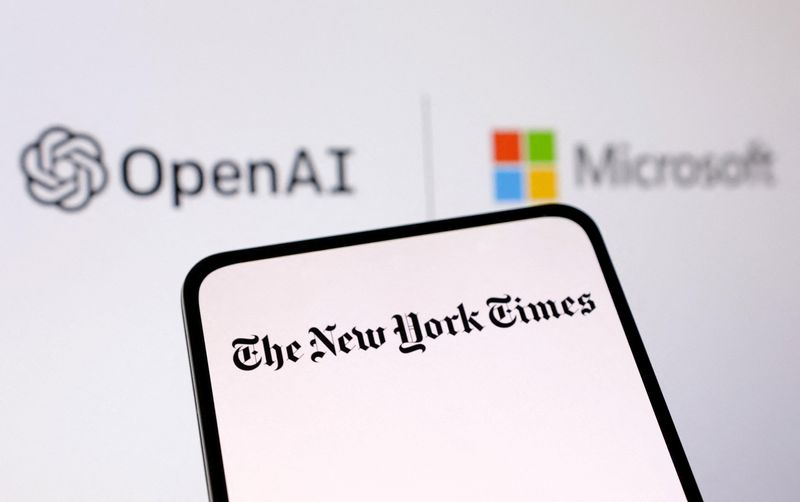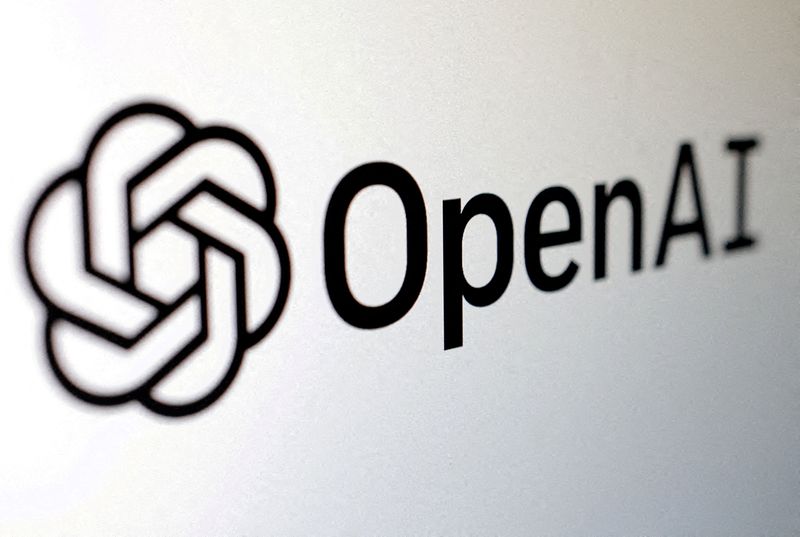By Jonathan Stempel
NEW YORK (Reuters) -The New York Times sued OpenAI and Microsoft on Wednesday, accusing them of using millions of the newspaper's articles without permission to help train chatbots to provide information to readers.
The Times said it is the first major U.S. media organization to sue OpenAI, creator of the popular artificial-intelligence platform ChatGPT, and Microsoft, an OpenAI investor and creator of the AI platform now known as Copilot, over copyright issues associated with its works.
Writers and others have also sued to limit the scraping -- or automatic collection of data -- by AI services of their online content without compensation.
The newspaper's complaint, filed in Manhattan federal court, accused OpenAI and Microsoft of trying to "free-ride on The Times's massive investment in its journalism" by using it to provide alternative means to deliver information to readers.
"There is nothing 'transformative' about using The Times's content without payment to create products that substitute for The Times and steal audiences away from it," the Times said.
OpenAI and Microsoft have said that using copyrighted works to train AI products amounts to "fair use," a legal doctrine governing the unlicensed use of copyrighted material.
On its website, the U.S. Copyright Office says "transformative" uses add "something new, with a further purpose or character" and are "more likely to be considered fair."
The Times is not seeking a specific amount of damages, but estimated damages in the "billions of dollars." It also wants OpenAI and Microsoft to destroy chatbot models and training sets that incorporate its material.
Talks to avert a lawsuit and allow "a mutually beneficial value exchange" with the defendants were unsuccessful, the 172-year-old newspaper said.
"We respect the rights of content creators and owners," OpenAI said in an emailed statement. "Our ongoing conversations with the New York Times have been productive and moving forward constructively, so we are surprised and disappointed with this development."
Microsoft did not respond to requests for comment.
$80 BILLION VALUATION FOR OPENAI
AI companies scrape information online to train generative AI chatbots, and have attracted billions of dollars in investments.
Investors have valued OpenAI at more than $80 billion.
While OpenAI's parent is a nonprofit, Microsoft has invested $13 billion in a for-profit subsidiary, for what would be a 49% stake.
Novelists including David Baldacci, Jonathan Franzen, John Grisham and Scott Turow have also sued OpenAI and Microsoft in the Manhattan federal court, claiming that AI systems might have co-opted tens of thousands of their books.
In July, the comedian Sarah Silverman and other authors sued OpenAI and Meta Platforms (NASDAQ:META) in San Francisco for having "ingested" their works, including Silverman's 2010 book "The Bedwetter." A judge dismissed most of that case in November.
The Times filed its lawsuit seven years after the U.S. Supreme Court refused to revive a challenge to Google (NASDAQ:GOOGL)'s digital library of millions of books.
A federal appeals court had found that the library, which gave readers access to snippets of text, amounted to fair use of authors' works.
"OpenAI is giving the copyright industry a second bite at control," said Deven Desai, a professor of business law and ethics at the Georgia Institute of Technology.
"It's outputs that matter," Desai said. "Part of the problem in assessing OpenAI's liability is that the company has altered its products as copyright issues arose. A court could say its outputs at this moment in time are enough to find liability."
Chatbots have compounded the struggle among major media organizations to attract and retain readers, though the Times has fared better than most.
The Times ended September with 9.41 million digital-only subscribers, up from 8.59 million a year earlier, while print subscribers fell to 670,000 from 740,000.
Subscriptions generate more than two-thirds of the Times' revenue, while ads generate about 20% of its revenue.
'MISINFORMATION'
The Times' lawsuit cited several instances in which OpenAI and Microsoft chatbots gave users near-verbatim excerpts of its articles.
These included a Pulitzer Prize-winning 2019 series on predatory lending in New York City's taxi industry, and restaurant critic Pete Wells' 2012 review of Guy Fieri's since-closed Guy's American Kitchen & Bar that became a viral sensation.
The Times said such infringements threaten high-quality journalism by reducing readers' perceived need to visit its website, reducing traffic and potentially cutting in to advertising and subscription revenue.
It also said the defendants' chatbots make it harder for readers to distinguish fact from fiction, including when their technology falsely attributes information to the newspaper.
The Times said ChatGPT once falsely attributed two recommendations for office chairs to its Wirecutter product review website.
"In AI parlance, this is called a 'hallucination,'" the Times said. "In plain English, it's misinformation."

Times general counsel Diane Brayton told staff in an internal memo that the newspaper recognized the potential of generative AI for journalism, but "the use of our work to create GenAI tools must come with permission and an agreement that reflects the fair value of that work, as the law provides."
The case is New York Times Co v Microsoft Corp (NASDAQ:MSFT) et al, U.S. District Court, Southern District of New York, No. 23-11195.
